Is Cape Town Safe?
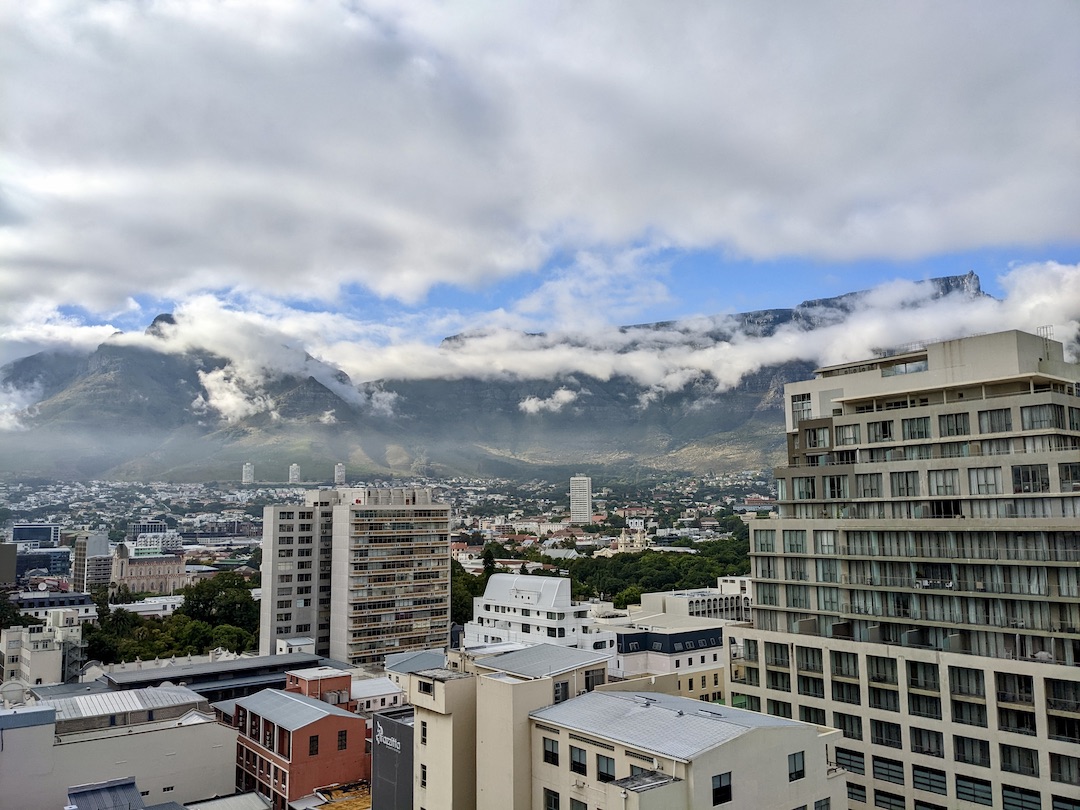
Are you thinking about travelling to Cape Town or South Africa, but worried about the safety situation? This guide contains safety tips and information based on our recent three-month stay in South Africa for tourists travelling to Cape Town or wider South Africa.
I wanted to write this blog because I found that a lot of what I had read about Cape Town online was out-of-date, misleading or inaccurate. Everything in this guide is up-to-date information for 2023. It’s all based on either our personal experiences or advice from locals unless otherwise explained. As always, travellers should check their government website for the latest travel information for South Africa.
First up, the good news. Charlie and I (Luke, here) spent three amazing months in South Africa. We spent most of our time in Cape Town and it was a truly incredible place to visit. We were not the victims of any crime in any way. The South Africans we met, almost without exception, were friendly and welcoming to tourists. We feel lucky to have met so many amazing people and learned so much about South African culture.
Now onto the bad news. Statistically speaking, South Africa has a high rate of homicide. It’s usually in the top ten countries worldwide for homicide, far ahead of most other African countries and not far behind countries like El Salvador, Venezuela and Belize. In my experience, there were lots of places in Cape Town and the surrounding areas that made me feel uneasy. A fair number of them made me feel unsafe. This included parts of the City Bowl (CBD).
I recommend that travellers to South Africa follow the following safety rules at all times:
How To Stay Safe in Cape Town and South Africa
- When out after dark, take an Uber (even if it’s just a few blocks)
- Don’t flash your cash/valuables
- Keep a close eye on your cash/valuables
- Know where you’re going before you get there (and walk there quickly and directly)
- Don’t take public transport (as tourists, we’re easy to spot and that means we may be more at risk of crime on public transport)
- Be careful when drinking alcohol
Use Uber if you’re out and about after dark
Using Uber after dark is something that I was told to do by my South African friend. This is because Cape Town quickly becomes more dangerous after dark.
The good news is that Ubers are safe and inexpensive. Drivers tend to have thousands of five-star reviews, so you can be sure you’re in good hands.
For additional safety, you can ask your driver to give you a pin so you can be sure you’re getting into the right car. Also, you can share your Uber trip, in real-time, with a friend or family member who can check that you’ve got to your destination safely.
I recommend avoiding the temptation to walk around after dark, especially if it’s part of the city that you don’t know well.
We walked through Company’s Garden as the sun was setting and the vibe changed from very relaxed to very sketchy much quicker than we were expecting. If in doubt, get an Uber.
Don’t flash your cash or place your valuables on display
Not flashing your cash and/or valuables is a common sense rule that applies in any big city.
If you’re sitting at a bar or restaurant and you have a bag, keep it between your feet so someone can’t grab it and run off. Don’t leave it unattended and don’t hang it on the back of your chair or leave it on a spare chair at the table. I’d recommend having a small bag that you can wear comfortably even when inside if your valuables can’t fit in your front trouser pockets.
I went out with just my debit card, phone and ID. I made sure that the debit card never had too much money on it and kept a spare card at my accommodation, just in case.
This is something I normally do when travelling and isn’t specific to South Africa.
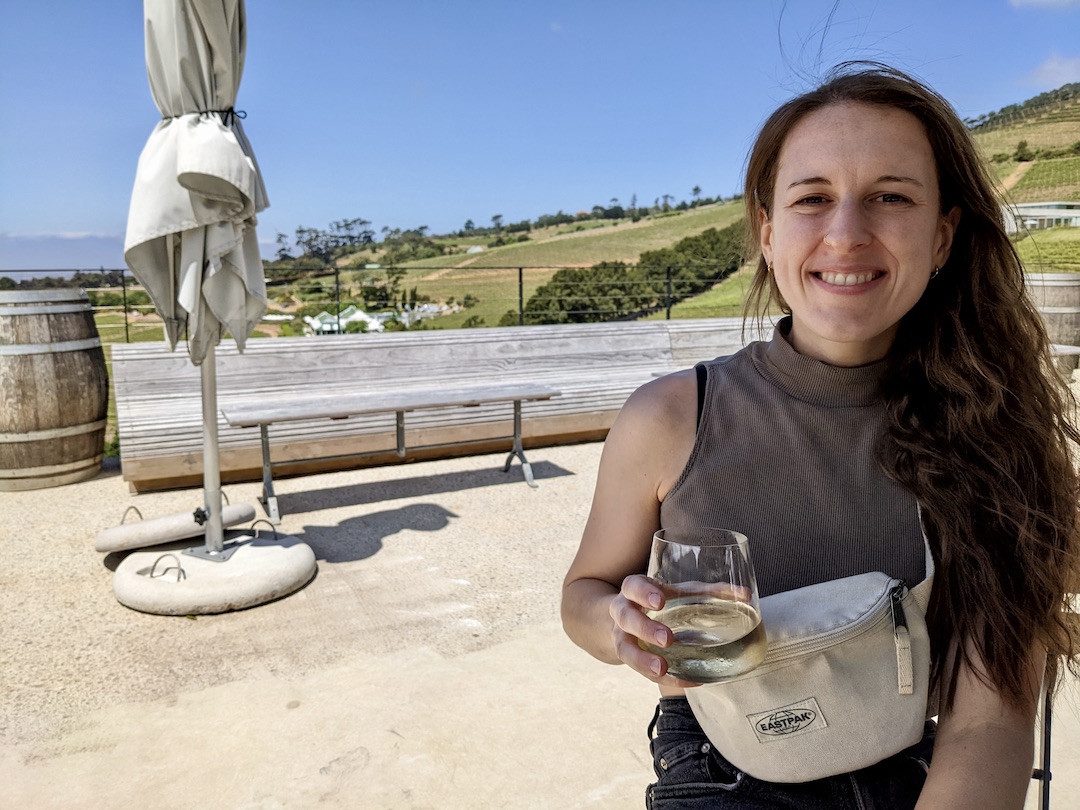
Charlie with her trusty Eastpak bag
Know where you’re going before you get there
If you plan to walk somewhere in Cape Town, it’s a good idea to have a look at the route on Google Maps before you start walking.
I found that some streets went from very nice to very sketchy in a matter of minutes. If you find yourself accidentally in a part of town that doesn’t look good, just trust your gut and walk back the way you came.
Try not to slow down too often to look at Google Maps on your phone. For one, this makes it very obvious that you’re a tourist and that you don’t know where you’re going. Using Google Maps too often whilst walking will distract you and slow you down.
Walking quickly, on the other hand, makes you less of a target. Don’t interact with anyone who stops you. This includes people in “official” looking outfits, who might be trying to scam you. Just say “no, thank you” and keep walking.
Be especially careful of anyone who attempts to direct you to an ATM to withdraw money. A common scam is for someone in official-looking gear to tell a tourist they need a ticket from the ATM because a road is closed. Accomplices wait at the ATM and jump the tourist when they get there.
Don’t use public transport
My South African friend told me never to use public transport in Cape Town. That includes both buses and trains. Whilst locals do use public transport, us tourists are easily recognisable and crime does happen on public transport in South Africa.
Again, Uber is relatively inexpensive, so this wasn’t a big problem. I’ve seen online that the MiCiti buses in Cape Town are considered safe, and the ones I saw looked fine, but I did not test them myself given that Uber was so affordable.
Be careful when drinking alcohol
Lastly, be careful when drinking alcohol. This is true for any big city (or anyone anywhere really) but especially true in Cape Town. This is because alcohol increases risk-taking behaviour and impairs your judgement — you’re more likely to do something stupid and get yourself in trouble when you are drunk.
Drink responsibly and take an Uber home at the end of the night.
Also, don’t accept drinks offered to you by strangers – even good-looking ones.
Things to Consider Before you Visit Cape Town
South Africa is a fantastic travel destination; one that I know many people would enjoy hugely. But it’s not for everyone. Consider the following before booking your ticket:
- How experienced are you at travelling?
- Are you nervous about travelling?
- Are you good at planning and staying alert?
- Are you travelling alone?
Firstly, how experienced are you at travelling? Of course, you can be the victim of crime no matter how experienced or inexperienced you are. But I do think that Cape Town is a better destination for experienced travellers.
If you’ve done backpacking in Central or South America, or Southeast Asia, you’ve probably picked up some safety lessons that will be helpful for your time in South Africa.
The next and perhaps most important thing to consider is your general anxiety/sensitivity levels to safety concerns. What I mean by this is that you might not have a good time if you’re very worried about crime.
I personally felt more stressed than normal for my first couple of weeks in Cape Town. This was partly because I didn’t choose a particularly safe part of town, so I was hassled every time I left my Airbnb and it took time to understand which streets beggars frequented.
This didn’t stop me from having a good time, but it would have been a less enjoyable trip if I’d only been there for a two-week holiday.
If you’re travelling alone, you’ll need to be even more careful. There’s safety in numbers.
Activities like hiking can be dangerous if you are alone and it would be best to either hire a guide, stick to the most popular routes that are always busy, or better still, join a hiking group.
I hiked both Table Mountain (Platteklip Gorge) and Lion’s Head with Charlie in November 2022. The routes are very popular and it felt like the number of people on the trails makes crime unlikely on those specific routes. We did both hikes on weekend mornings after the sun had already risen when we knew other walkers would be on the routes and knowing we would finish our walk before sunset.
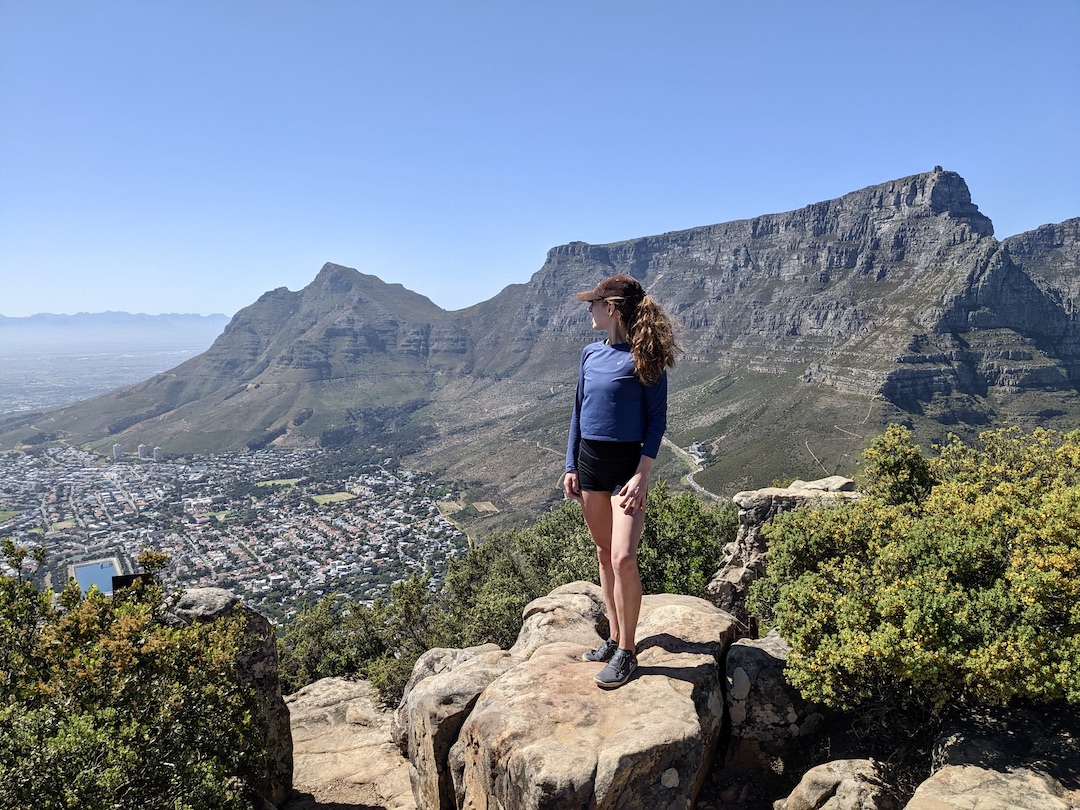
Which Areas of Cape Town are Safest?
I really wanted to write this guide because I read a few places online that most places in the City Bowl District (CBD) are safe.
This might have been true a few years ago, but it didn’t feel that way to me.
Having said this, I know other people who have visited Cape Town and say it’s no more dangerous than big cities in Europe or the United States. I disagree, but respect that everyone’s personal experience and opinions may be different.
For our first apartment, we stayed on Darling Street, which is right in the middle of the city centre. It’s close to Long Street, which can be thought of as the “main” street in the city. We were hassled by homeless people asking for money, every time we left the apartment. They were not aggressive but they were sometimes confrontational.
For our second apartment, we stayed on Leeuwen Street (right by Bree street). It made a huge difference and we barely got hassled at all. It made me realise that location is very important when staying in Cape Town. This street was only around five blocks away from our first apartment to put into perspective how quickly the safety of an area can change.
If I was recommending Cape Town to someone visiting for just a couple of weeks, I’d suggest the following areas:
- Camp’s Bay — expensive beach location, away from the centre of Cape Town
- Bakoven — expensive beach village, far from the CBD
- Clifton — expensive beachfront area
- Waterfront — upmarket part of the CBD, next to the docks
- Kalks Bay — beach village with tidal pools for swimming, far from the CBD
- Bree Street — trendy street in the CBD, but surrounding areas are less safe
- Kloof Street — trendy street in the CBD, but surrounding areas are less safe
I’d certainly suggest looking for somewhere with a 24/7 security guard at the foyer. We had this and I always felt perfectly safe inside both apartments in Cape Town. We also specifically chose not to stay in ground-floor apartments when staying in Cape Town’s CBD.
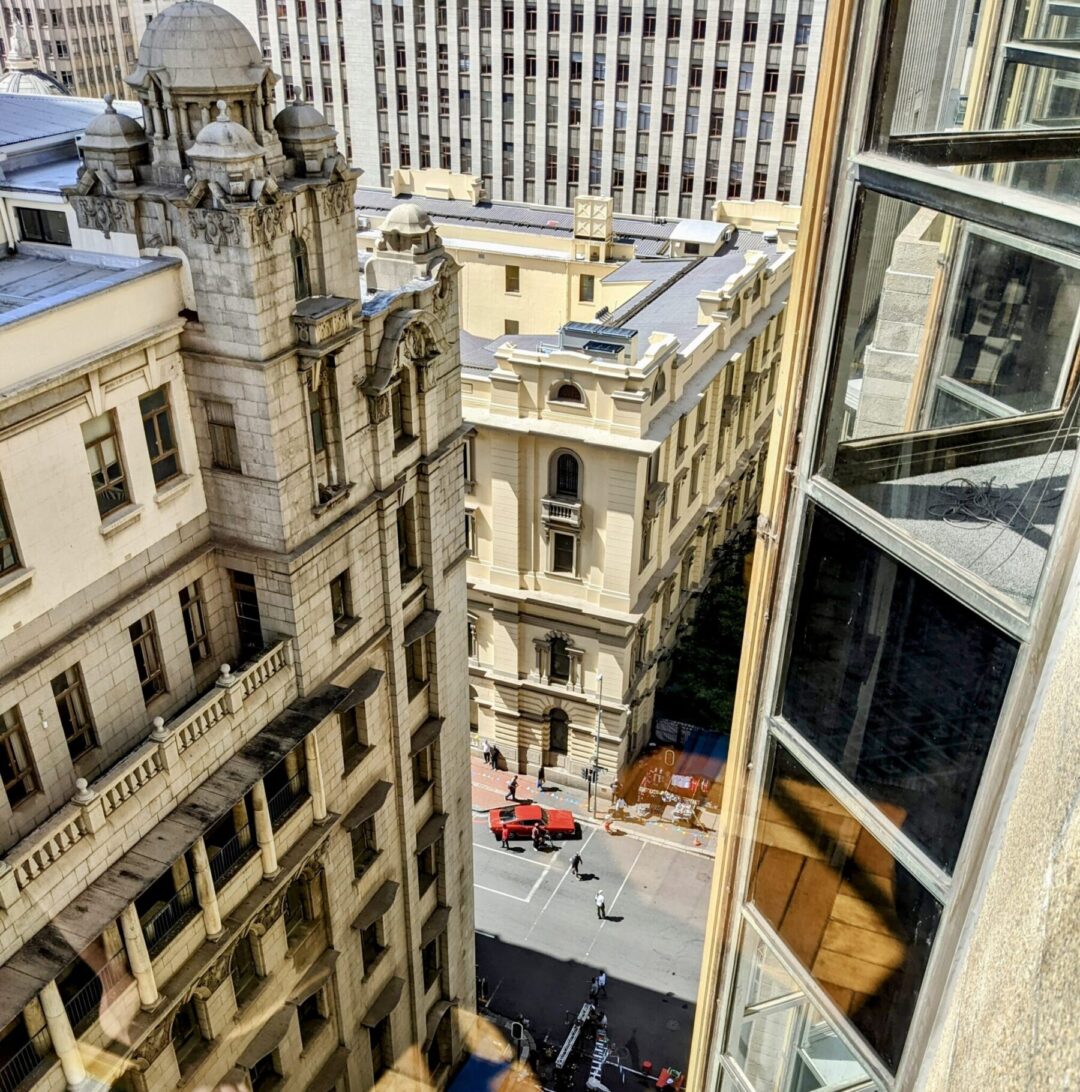
What Does the Safety Situation Feel Like in Cape Town?
I read a lot about Cape Town’s safety situation before I visited, but I don’t think anything I read really described the situation as it felt to me. I’ve tried to do that here:
- Informal settlements (townships) are common but they are avoidable
- You will probably notice more security features than you are used to
- Beggars and homeless people can be confrontational
- Uber drivers can be very tense when driving
The townships are the informal settlements that poor South African communities live in. They are affected by the highest crime rates in the country.
They look like the favelas of South America and can be found all over, including on the drive between Cape Town airport and Cape Town itself. However, it’s very difficult to end up in a township by accident, so this is unlikely to affect your trip unless you visit one, which is not recommended.
One of the things you’ll notice immediately is that people take security very seriously. There are lots of private “armed response” companies and you’ll see their vehicles, staff and promotional posters dotted all around.
Electric fences are common, as are barbed wire fences, security cameras, barred windows and dogs. One of the gyms we used had emergency panic buttons. I also saw panic buttons on lamp posts.
There are people hired to promote public safety all over the CBD. They normally wear high-visibility vests that say “CCID.” Unfortunately, I don’t think you can rely on these people in an emergency.
Whilst some are no doubt hard-working and professional, a lot of them simply play on their phone or find a shady spot to nap in.
Cape Town has a lot of homeless people and some of these people are in really bad shape. A lot of them are hungry and some are dressed in little more than rags.
Some of them have obvious mental health problems. Most of the homeless people we encountered were friendly and polite, but many of them asked us for food or money and some became confrontational. In these situations, the public safety officers did not intervene or support in any way, even if they were close by.
Many live on the streets under pieces of tarpaulin or whatever they can get together to provide some protection from the elements. You’ll find these shanty towns under freeways and in parks and green spaces across the city, including the CBD.
We also noticed that some Uber drivers were very tense. We spoke to one Uber driver who’d recently been attacked by a homeless person with a rock. Others were very jumpy no doubt as a result of working in conditions that could sometimes be dangerous.
They will normally lock the doors as soon as you get in and some will want to know your name to check they have the right person in their car. I’m not judging the Uber drivers for this at all, but it does tell you that the locals don’t feel particularly safe either.
To summarise:
- Cape Town is an awesome destination and South Africans are amazing
- If you’re planning to stay in Cape Town, choose your location carefully
- When in Cape Town, follow the safety tips and stay vigilant
If you’ve read this blog and you’d still like to visit, I highly encourage you to do so. Cape Town is a simply stunning place and there are many incredible things to see and do.
If you’re less sure about visiting, I recommend that you take a look at places like Camp’s Bay, Kalk Bay and even Stellenbosch and Franschhoek. These places are far from the city centre and feel much safer and more relaxing, so you can still experience South Africa.
If you’re planning to visit Cape Town and you have safety questions, leave a comment below and we’ll get back to you!


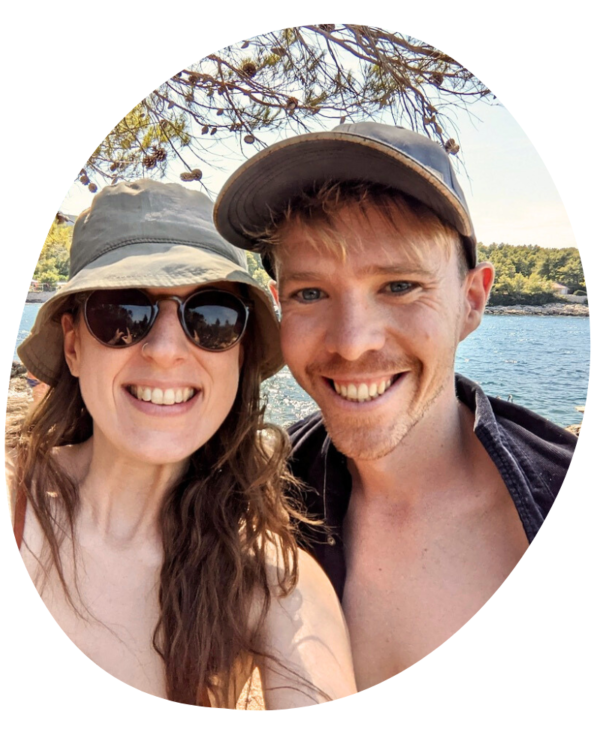


Lisa
Hi! Really appreciate your insight and experience. My husband, myself and our 17 and 15 year old daughters will be staying in Clifton July 13-16. We are experienced travelers, but a bit concerned. We have a cape peninsula driving tour one Day and a half day city driving tour booked. We did book an African experience dinner that includes transfer, but it will definitely be dark when done. We will be picking up a car at the airport on the 16th and driving to Franshool and Mossel Bay and to a game reserve, then Ostrich Town and back to Kings Rd., Sea Point area in Cape Town for the last night and plan to shop at V& A. Hoping we chose good areas for our family. We did tons of research. Would appreciate your input. Thank you for your time. All the best to you both!
Charlie Marchant
Hi Lisa – This sounds like a great trip and I’m sure it will go smoothly! We also had some evening transfers and uber rides, but we weren’t travelling through any specifically dangerous areas or informal settlements and were fine. I hope your family have a great trip!
Jen
Thank you for all the information! I have been looking at transfers to/from the airport to my Airbnb in Moiulle Point. I think I am going with a private transfer just to have the car waiting on me since I am getting in at 2245 hours. I plan on doing the Cape Town Free Walking Tours and also a Bo Kaap Cooking Tour, Robben Island, Aquila Safari, Full Day Cape Town Tour, and a full day Cape Agulhas Tour. I am also going to a concert at the GrandWest Grand Arena and hope the uber will be easy to get after the concert (probably about 11pm). Are there are tour operators that you suggest? I am a solo traveler and have a handful of restaurants I want to check out- my plan is to eat out at lunch and be home at night so I am not in the city alone after dark
Charlie Marchant
Sounds like a great trip, Jen! I recommend using Get Your Guide for tours and checking the reviews. I would also research any safari independently of tour websites to ensure they’re ethical.
Olivia
Hi, thanks for putting together this very informative guide! I have been to Cape Town before but as a volunteer staying in a locals house. I am travelling with my partner who is a tall male (I am hoping this will help deter people compared to if it was just me) and we are staying in Hout Bay for the majority of the trip, which Is where I stayed before. I am slightly concerned about the parking situation and about driving through dodgy areas as we have hired a car (due to the bad public transport and horror stories about taxis I had heard). What were the main steets/areas you would avoid in and around the Cape Town area? And if you drove anywhere did you manage to safely park in places? How did you plan your route?
Charlie Marchant
Hi Olivia – We travelled everywhere around the city by Uber and found it very affordable (very cheap compared to UK and USA Uber pricing) and also spent 1 day on the hop-on, hop-off bus which was very convenient for travelling longer distances around the city. We don’t have any experience driving ourselves in Cape Town to share I’m afraid, but I would recommend not driving out too late and making sure you have your doors locked when driving. Hope you have a great trip!
Susan
Hello both – been traveling to RSA for 30 years – really liked your blog and account of safety – thank you – we arrive in Cape Town /airport close to midnite – had intended picking up rental car and driving to hotel in VA area since hotel has no courtesy transport – thoughts?
Charlie Marchant
Hi Susan – We didn’t drive or travel by car at night. You would go straight down the N2 highway from the airport to the V&A Waterfront so it would be a straight-forward drive and only about 30 minutes in total. When you come off at the intersections though, I would make sure to have your doors locked and to have all of your luggage in the boot so that you don’t clearly look like tourists.
Diego
Hi! On December 1st we are travelling to Cape Town. We are planning to go the first day to Lion’s head to do a sunset hike. Our accomodation is in CBD at Buitenkant Street, do you reccomend to drive to Lion’s head with our car or better to take an uber to go and come back as it will be dark after we finish? Do you know any other reputable taxi company to use?
Thanks!
Charlie Marchant
Hi Diego – I would be careful hiking at sunset if you are going on your own and ideally plan to finish before the sun is down. Ubers will be readily available and there are also a few parking spaces near to the trail head (these are on the side of the road). Definitely do not leave any valuables in your car if you decide to drive.
Allie
Hi Charlie
Did you use the basic Uber ride or Uber Black? I’ve heard that there are very big differences in terms of how comfortable and safe one feels. Also, you mentioned that Ubers should be taken after dark, even if you’re only a few blocks away from your destination. Does this apply to CTD areas? I’ll be moving regularly between Bo Kaap, City Bowl and Waterfront.
Thank you!
Charlie Marchant
Hi Allie – We used the standard Uber and this was fine. Yes, this applies to the City Bowl area for definite.
Maria Andrea
Hi,
love your blog.
I’ll be traveling to Cape Town in April for a social project with my university but arriving solo saturday 9:30pm. Do you think it is better to have a private transfer scheduled or just take an uber when arriving?
I do not know where to book the private transfer, if you know any websites, would really appreciate it.
Thank you! :)
Charlie Marchant
Hi Maria – I think that either option would be fine. I would recommend asking your university if they can recommend someone for a private transfer.
Karen Bekker
I’m an ex South African (now Canadian), haven’t been to CT in 29 years. I’m picking up a rental on a Sunday at 11am at the airport and driving to the V&A Hotel. I’m nervous as recently heard of a family who were targeted as it was recognizable as a rental car, all bank cards stolen, they threatened to rape this couples daughter if they didn’t cooperate. Should I arrange for someone to accompany me on that drive?
Charlie Marchant
Hi Karen – I would recommend that if you are driving unaccompanied, then to lock your doors and to have your luggage in the boot and not open view on the seats or back seats. There unfortunately is risk and Luke and I were fortunate not to encounter any such incidents ourselves. It is not a long drive, but it is down to personal preference how safe you feel to do it. If you do, try not to stop or pull over anywhere on route and drive directly to the V&A Hotel.
Debbie
Hello,
Love your blog and all your recommendations! My daughter and I are traveling to Cape Town very soon. My daughter is a very seasoned traveler but I am very nervous. We have rented a car to drive from the airport to our hotel and for the week to drive ourselves around. Do you have any contacts that we could reach out to so we could hire someone to drive us around?
Carey Bellamy
Hi Debbie,
Tagging into your question…
Hi Charlie and Luke,
My daughter and I will also be in Cape Town soon for three days. We are also wanting to hire a car to drive around Cape Town and to Signal hill and to drive to Cape Point and stop at a few places along the way.
We would also like to know of you have any contacts for a nice driver to drive us around instead of hiring a car maybe?